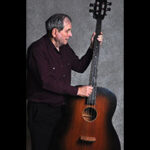Nobody else is going to be able to save the music
By Jon Liebman
January 27, 2023
What a joy it is to get first-hand advice from a different bass player every week and to pass it along to the FBPO audience.
This week’s interview is with NYC session mogul Frank Gravis, who’s played with everyone from Herbie Mann and Chuck Mangione to Bo Diddley and Phoebe Snow. That’s also Frank’s bass on the Rupert Holmes smash hit, “Escape (The Piña Colada Song).”
Since he’s done so much as a professional bass player, I asked Frank what advice he had for old rockers who want to learn bass. If you do everything he says, you’ll be a better bass player for sure.
Find opportunities to play
Maybe the pandemic isn’t 100% behind us, but with life seemingly getting back to normal, for the most part, Frank advocates going out and getting together with other people to play.
“Music is fun on all levels,” says Frank. “It doesn’t matter if you’re playing ‘Chopsticks’ on a piano. If you want to go out and play bass, go out and play. Find opportunities to play. Go out and find a bunch of friends that have the same interests and the same desires as you.”
Isn’t it great that we can do that again? While we all did the best we could with Zoom, etc., over the past couple years, there’s nothing like that live interaction of playing together in person.
Play with people who are better than you
Personally, not having picked up a bass guitar till I was 15, and never having touched an upright till I was 19, I was constantly playing with people who’d been doing it longer than I had, so I could totally relate to this part of Frank’s advice.
“Go out and try to play with musicians better than you,” he says, “because that will up your game better than anything.”
I can tell you first-hand that you can’t help but learn fast in that situation (even though it may not always be much fun for the rest of the band). It also gives you a clearer picture of what you’re setting out to accomplish.
“Just open your ears, know what it is that you’re going for,” Frank continues. “Have a picture in your mind of what you want to sound like. If you can’t play what it is you hear in your mind’s ear, woodshed until you can get it.”
Learn how to lock in with the drummer
Everyone who’s ever set out to learn bass has been told how important it is to “Lock in with the drummer.”
But how do you do it?
First off, Frank says, you start by clearly defining what it means to groove.
“It can be boiled down to this,” he explains. “It’s playing perfect metric time with enthusiasm. That’s what grooving basically is.”
Wow! I never heard grooving described quite like that. What a great definition.
“You and the drums agree perfectly on every note,” he says, “where (it) should be placed, and what attitude that you need to take with what it is that you’re playing. Know what it is that you want to sound like and just work on it until you sound that way.”
Get good at playing repetitive figures
It takes a lot of discipline and self-control to be able to play the same thing over and over with little or no changes, but that’s what we’re often called upon to do as bass players.
“I won’t lie,” says Frank. “Sometimes it’s not easy. You know this as well as I do, Jon. Sometimes one of the hardest things to do is to play a repetitive pattern over and over and over again and play it perfectly every time.”
While that’s undoubtedly true, that discipline all too often gets some pushback from wannabe bass players, which is unfortunate. Don’t avoid it; embrace it.
“A lot of people would say, ‘Well, that’s kind of boring,’” Frank says. “Well, no. That’s your job. If that is what the music calls for, that is what you have to be able to do.”
Make the music feel right
Playing bass is not a totally mechanical process. While grooving does require meticulous attention to playing precisely, the bass player must also inject a human, “feel-good” element.
“You got to be able to make the music feel good and play the right thing all the time,” Frank says. “You’re like the drums. If you would listen to any drummer, a drummer is going to sit there and play a beat, and it’s going to sound repetitive and it’s going to be two bars, or four bars, repeated over and over again.”
And of course, like Frank says, that perfect metric time must be played with enthusiasm.
“And the same goes for bass,” he says. “You got to be there. You got to make the music feel right because if you don’t make it feel right, nobody else is going to be able to save the music. If you make it feel good, the walls could tumble down around you and it would still be feeling good,” says Frank, “and then that’s on everybody else.”
Summing it up, Frank says, “As long as the drums and the bass are locked in, and between them the music feels good, it’s a beautiful thing.”
Next steps
How about you? What kinds of things have you tried in order to get better at locking in with the drummer and making the music feel good? Leave a comment below and share your experience. For more thoughts on the subject, watch my complete interview with Frank here.






More great stuff, Jon. Thankyou for your tireless efforts in bringing the hard won wisdom of these great bassists to us! They all know that real-world bass playing is simple, repetitive, disciplined stuff and yet they STILL love it! We need to ponder that and ask “why?” before we spend another minute practicing our instrument. As a latecomer to bass I made a very conscious decision not to pursue dazzling chops – I simply don’t have enough time left! – but rather Dunn-like precision and consistency. I know it’s the right way to go because for years I was a drummer and this is exactly the sort of bass player I was always looking for! There was nothing worse than bass players who wanted to “show us what they can do”…. hated it. I try to be essentially invisible… ie when I’m hitting the right notes at the right time no one really notices me – but they sure do if I stop! That’s perfection for me.
Love it. Thanks, Grayden!
That was spot on, Jon! I’ve done my best to live by those standards since I began my bass journey way back in 1978! Timeless advice for anyone that is embracing the low end! Thanks for the post!
Thanks, Joe. Glad to hear it!
I dont agree with “And of course, like Frank says, that perfect metric time must be played with enthusiasm.”. Good groove is not perfect metric (metronomic?) time. Groove is deeper and less tangible than metric time, and in my experience comes from LOTS of listening and practice at what you listen to. Additionally, being able to groove in funk, or R&B, or rock or jazz, is arguably not the same skill. Ron Carter is arguably THE seminal master of swing (who is known to speed up or slow down at his discretion…. putting the metric time idea out the window), but he may not be the guy if you want the baddest funk groove. The same thing if you shift genres to say, latin, or rock, or blues. Metric time is simply being able to play at a consistent meter without moving the setting (ie without speeding up or slowing down). I know plenty of guys who can play nearly perfect metric time, but who have ZERO groove.
Good points, David. I think the gist is the ABILITY to play perfectly in time. Of course you need to be sensitive to the music you’re playing and adjust accordingly if and when needed. I think we’re on the same page. Thanks for commenting!
Know the tune. To play with feeling, to really lay down a groove you’ve got to own it and not be constricted by having to think about the next chord change.
Right on, Robert! The same goes for knowing your music theory to the point you don’t have to think about it while you’re playing. Thanks for the comment!
I’m coming to bass after decades of performing, off and on, as a guitarist in the genres of surf, classic rock, gospel, folk-rock and folk. The bass players I most liked to play with were hardly noticed, believe it or not. You could feel the energy, the thump, the low end they brought to the song, but rarely did I hear them in the sense that I “listened” to them while playing. When they played well, they just seemed to meld into the song appropriately. The ones I least liked playing with were off-beat at times, played phrases inappropriate to the song, had poor tone or just looked bored.
When I was playing lead or rhythm guitar and smiled because the bass player was setting the feel and the groove, it just took me to my happy place. I would look over at him or her and smile…and they knew exactly what that meant.
Good observations, Skyflyer. It comes with the territory! 🙂 Thanks for weighing in.